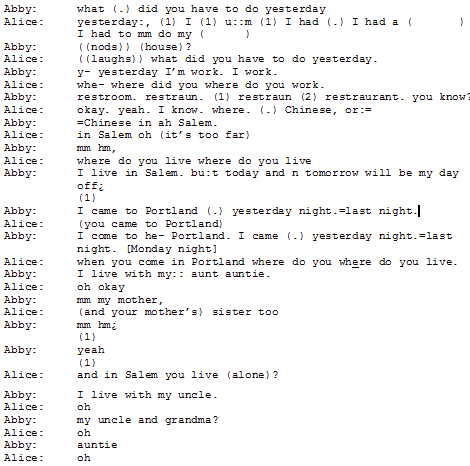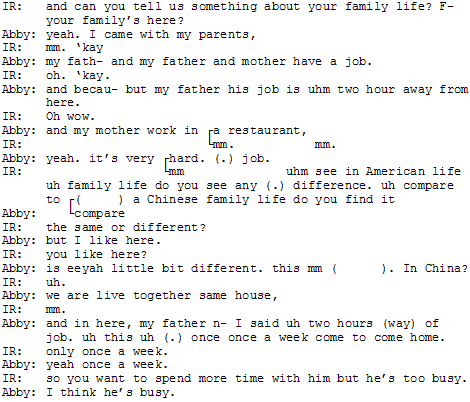Abby had an extended family in the Portland area which allowed her to move between Salem and Portland for purposes of work and study. In the following interaction with Alice from Abby's sixth term of study at the Lab School, Alice asks Abby about her work and living situation. We see that Abby works and lives in Salem, Oregon part of the week and in Portland part of the week. She leaves Salem on Monday night and goes back to Salem on Thursday evening. She spends Monday night through Thursday morning in Portland where she takes classes on Tuesday and Thursday mornings.
May 4, 2004, Tuesday
| (Click to View) (Requires Internet Explorer) | |
 | |
| Hide Conversation |
While Abby mentions at several times and in different contexts (classroom interaction and interviews) that she finds life in the U.S. easier than in China, she notes differences in her family life here in the U.S. In an in-home interview from 2004, the more transient nature of U.S. society comes out when Abby mentions that it is difficult that her father must live and work in a different place from where she and her mother lives.
2004
 | ||
| Hide Conversation | ||
While extended families are important points of support for a younger person like Abby (early 20's), younger generations in immigrant families face certain pressures from their parents, grandparents, aunts, and uncles. Abby talked about how she must call the doctor's office for her mother and take her to appointments. And when asked about how her family helps her with English language learning, Abby mentioned a potential point of pressure that she faces from her parents in her quest to improve her English.
15:00| I: | In what way does your family help you in your learning English? |
| Abby: | My family? My mom and dad do not speak English. No, not much. |
| I: | You don't think they help any? Do they encourage you to learn more? |
| Abby: | Yes, they say: Work hard! We are depending on you. We don't know English. |
While the question from the interviewer was about whether her family encourages her learning, Abby's response suggests that her parents express their dependence on Abby in their exhortation to Abby to work hard.
